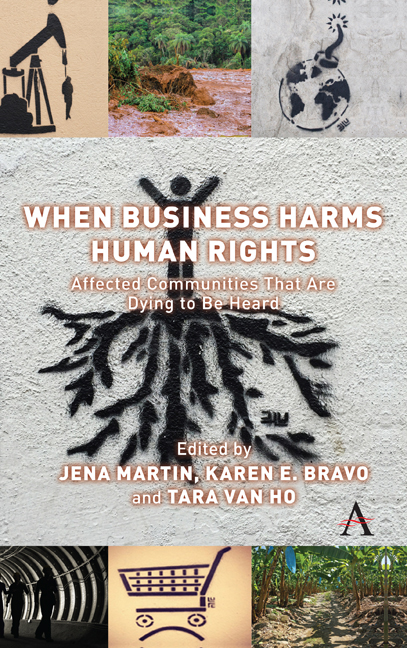Book contents
- Frontmatter
- Contents
- Preface
- Acknowledgements
- Introduction
- Chapter 1 Complicity in False Arrest, Imprisonment and Theft by a Fairtrade-Certified Company
- Chapter 2 Hindrances to Access to a Remedy in Business-Related Cases in Colombia: The Case of Gilberto Torres
- Chapter 3 The Global Pursuit for Justice for DBCP-Exposed Banana Farmers
- Chapter 4 The Rupturing of the Dam and the Community’s Social Fabric: A Testimony from an ‘Atingido’ from Bento Rodrigues, Brazil
- Chapter 5 Taming the Dragon, Unpacking Options for Access to Remedy for Violations by Chinese Multinational Corporations Operating in Chiadzwa, Zimbabwe
- Chapter 6 Máxima Acuña: The Story of How a Business Impacted Human Rights Defenders
- Chapter 7 Community Interrupted, ‘Life Projects’ Disrupted: Cajamarca, Ibagué, and the La Colosa Mine in Colombia
- Chapter 8 Occupational Health as a Human Right: A Case Study in a Turkish Free Trade Zone
- Chapter 9 The Price of the ‘Black Dollar’: Veteran Coal Miners and the Right to Health
- Chapter 10 Abandoned: A Tale of Two Mine Closures in South Africa
- Conclusion
- Appendices
- List of Contributors
- Index
Chapter 1 - Complicity in False Arrest, Imprisonment and Theft by a Fairtrade-Certified Company
Published online by Cambridge University Press: 20 January 2022
- Frontmatter
- Contents
- Preface
- Acknowledgements
- Introduction
- Chapter 1 Complicity in False Arrest, Imprisonment and Theft by a Fairtrade-Certified Company
- Chapter 2 Hindrances to Access to a Remedy in Business-Related Cases in Colombia: The Case of Gilberto Torres
- Chapter 3 The Global Pursuit for Justice for DBCP-Exposed Banana Farmers
- Chapter 4 The Rupturing of the Dam and the Community’s Social Fabric: A Testimony from an ‘Atingido’ from Bento Rodrigues, Brazil
- Chapter 5 Taming the Dragon, Unpacking Options for Access to Remedy for Violations by Chinese Multinational Corporations Operating in Chiadzwa, Zimbabwe
- Chapter 6 Máxima Acuña: The Story of How a Business Impacted Human Rights Defenders
- Chapter 7 Community Interrupted, ‘Life Projects’ Disrupted: Cajamarca, Ibagué, and the La Colosa Mine in Colombia
- Chapter 8 Occupational Health as a Human Right: A Case Study in a Turkish Free Trade Zone
- Chapter 9 The Price of the ‘Black Dollar’: Veteran Coal Miners and the Right to Health
- Chapter 10 Abandoned: A Tale of Two Mine Closures in South Africa
- Conclusion
- Appendices
- List of Contributors
- Index
Summary
Introduction
The town of Njombe-Penja is located in Cameroon's Moungo Division in the Littoral Region. With a nutrient-rich volcanic subsoil, tropical climate and deeply rooted plantation economy, Njombe-Penja is one of the banana production capitals of Cameroon. Indeed, Njombe-Penja is home to the largest private banana production company in the country, Société des Plantations du Haut Penja (PHP). PHP accounts for nearly 50 per cent of all banana production in Cameroon and is owned by the French multinational company Compagnie Fruitière de Marseille (‘Compagnie Fruitière’).
There has been significant conflict between PHP and the local population of Njombe-Penja almost since PHP's arrival in the region in 1990, when Compagnie Fruitière was able to acquire a majority stake in the now defunct state-owned Cameroonian Banana Organization (CBO). Early allegations against the company included land grabbing, soil, water and air pollution and egregious labour rights violations – including the routine spraying of pesticides on field workers and the violent suppression of unionized workers in 1991 and 1992. Conflict with the company came to a head in 2007 when Njombe-Penja's former mayor Paul Eric Kingue publicly accused the company of, among other things, failing to pay taxes to the local authority during its near 20 years of operation – thus depriving the town of muchneeded funds for development. Kingue was subsequently jailed in 2008 on what are widely believed to be trumped-up charges and was only released in 2015 after interventions by multiple UN bodies.
Despite these controversies, PHP became Fairtrade-certified in 2013. Fairtrade International (‘Fairtrade’) is an international standard-setting body that works to ‘connect disadvantaged producers and consumers, promote fairer trading conditions and empower producers to combat poverty, strengthen their position and take more control over their lives’. Fairtrade works by auditing and certifying producers, traders and companies for compliance with standards around terms of trade, labour rights, health and safety standards and environmental protections. As noted on the Fairtrade International website, ‘When a product carries the FAIRTRADE Mark it means the producers and traders have met Fairtrade Standards […] designed to address the imbalance of power in trading relationships, unstable markets and the injustices of conventional trade.’
- Type
- Chapter
- Information
- When Business Harms Human RightsAffected Communities that Are Dying to Be Heard, pp. 13 - 30Publisher: Anthem PressPrint publication year: 2020



